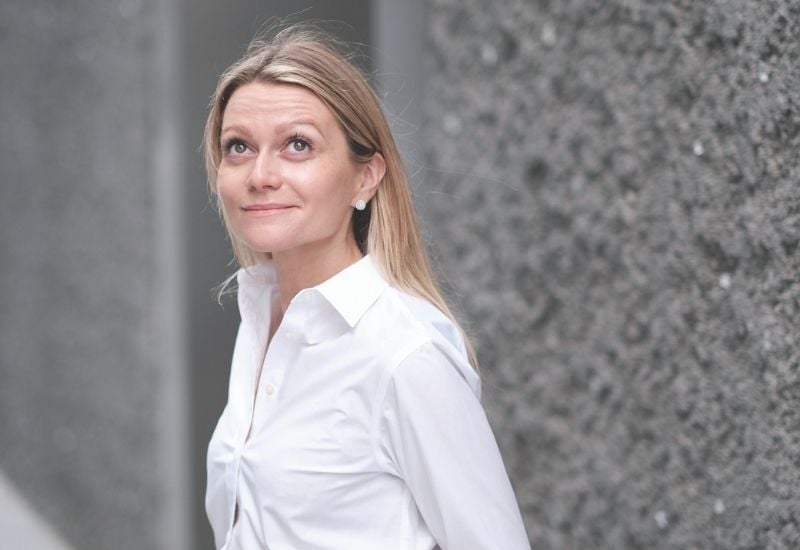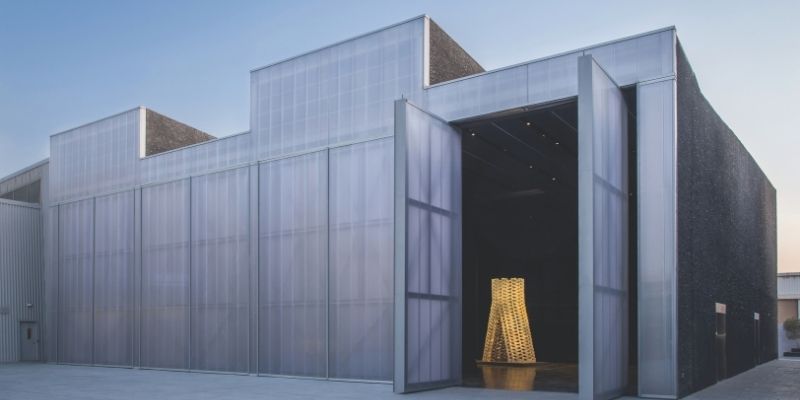April’s – ‘The Gratitude Issue’ – Download Now
Alserkal’s Executive Director, Vilma Jurkute on launching a new sustainability agenda whilst reimagining the cultural space.
What do the first 30 mins of the day look like, your morning routine?
My mornings are dedicated to self-regeneration and knowledge. I usually start with a workout, followed by an iced coffee and a lot of reading to make sure that I am up to date on news and current affairs. I make time to reconnect with my academic research situated across the various disciplines of urban studies.
What is your approach to sustainability? What sustainable practices are currently in practice at Alserkal and do you have any additional plans to develop this?
The word Anthropocene begins with a Greek word ‘antropos’, meaning human, and as we try to address the undeniable human impact on the environment, I believe we must begin with a self-audit. Sustainability demands a political and intellectual solution, involving complex alliances of actors from all over the world. Resisting the temptation of addictive growth and progress and reappraising our conditions of production and consumption are the important ideological steps towards change. I am mindful of how easily terms like ‘sustainability’ can become commodified over time, often endorsed through tokenised infrastructure solutions. At Alserkal, we have formed a Sustainability Working Group to develop solutions, not only through projects such as solar power, recycling and pedestrianisation but by changing our behaviours and focusing on economies of repair as a community at large. It is a big task— we must reimagine what circular economy means for our part of the world and for the creative industry overall.
How has this community scaled in growth since its inception?
Alserkal Avenue is an inclusive space, a cultural inventory assembled from various industries and disciplines in art, design, architecture, literature, film, performing arts, lifestyle and food, all in the context of the industrial area of Al Quoz. The Avenue’s grassroots evolution was spearheaded by risk-takers driven by tenacity and creative ambition in a city that has always embodied potential. While we might be just over 10 years old, we have, individually and collectively, contributed to the cultural ecosystem of the UAE and beyond, reflecting our polyphonic identities, artistic commitment, and diverse knowledge paradigms. As a collective of over 70 creatives, cultural thinkers and makers, we have always been driven to challenge the conventional and see the boundless possibilities of the work we do.

What have been the biggest hurdles to date and how did you overcome them? What key lessons are you grateful for in business?
It is never easy to be the ‘first’ or a pioneer because there is no model or playbook you can follow. I take comfort in ad- vice someone once gave me—‘don’t be afraid of uncertainty, it means you are innovating’. To be honest, when we started, I feel like the West didn’t know what to do with us because we didn’t fit any of their ‘boxes’, in terms of art paradigms. We began as an arts neighbourhood in the Al Quoz industrial area, then through Alserkal Avenue’s expansion in 2015, we extended our platform to welcome a curated community of entrepreneurs across various industries, acting as a building block for the creative economy locally and through our commitment to artistic production, residency programmes, scholarship and research we evolved further as an institution, forming the Alserkal Arts Foundation. It created a context-specific and organic model that responds to our city, our history and public. Alserkal and its initiatives are everyone’s community commons: collaborative, open, experimental and flexible by nature.
Why do you think Alserkal Avenue has holistically grown as a centre for the arts and design?
How has the concept of culture and heritage in Dubai grown over the last few years? Despite the rapid commercial growth that Dubai has seen, our arts and culture scene is still young, and the potential that it offers to young artists is immense. We need only to look at the growth that has taken place over the last decade to realise that the momentum will continue to pick up the pace. Dubai’s arts ecosystem, which started with just a few commercial art galleries a decade ago, has grown to become a holistic art scene. We’ve witnessed the development of robust education programmes, not-for-profit spaces with active community programming, and the emergence of new collectives and homegrown concepts within the creative industries. Locally-based talent is more eager and more able than ever to develop their artistic practices locally now that there is the infrastructure to support that; the Alserkal Arts Foundation space was a big step in further enhancing the Alserkal family’s commitment to the arts. The next step, as our founder Abdelmonem Alserkal always reflects, ‘Is not about physical expansion, but about legacy building through nurturing artists, not-for-profit programmes and research endeavours.’
How does this cultural district continue to celebrate homegrown talent?
We grew to become the region’s most influential arts and culture destination over the last few years, and for that we are indebted with gratitude to the home-grown art galleries and the new international spaces that have chosen Alserkal Avenue as their home. With our expansion in place, it was essential to protect our cultural integrity by creating an environment for knowledge-sharing amongst the best talent. We are continuously building an arts infrastructure with many ‘firsts’ along the way. In order for the ecosystem to flourish, it was essential to create a space where culture is produced and consumed and driven further through artistic discourse. I cannot help but remember an old TV interview of Leo Castelli’s (the famous collector and gallerist in New York in the 70s), where he was asked on what basis he selected his artists and his answer was ‘I pick them not because they are good, but because they are the leaders of a new movement’. I think the same applies to our community members at Alserkal. We take the risk on the risk-takers and through our collective efforts further grow the impact of the arts in the city and beyond. Alserkal Arts Foundation forms an important pillar of our public promise at Alserkal. As a non-collecting foundation, we are committed to artistic production, residency programmes, research grants, and alternative learning through colloquia and other forms. Supporting a new generation of thinkers to challenge the conventional leading to new forms of knowledge is what lies at the heart of our mandate.
This is ‘The Gratitude Issue’ – what are you grateful for?
Community. The erosion of boundaries through shared compassion is something I will carry with me from this pandemic. Over the past year, the aspects of collectivity, togetherness and giving back that are an intrinsic part of our community ensured that we never felt alone.
April’s – ‘The Gratitude Issue’ – Download Now
– For more on luxury lifestyle, news, fashion and beauty follow Emirates Woman on Facebook and Instagram
Images: Supplied












